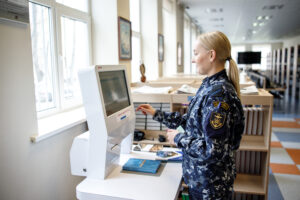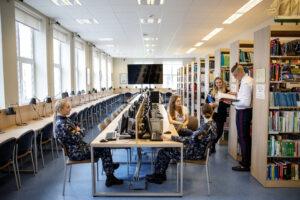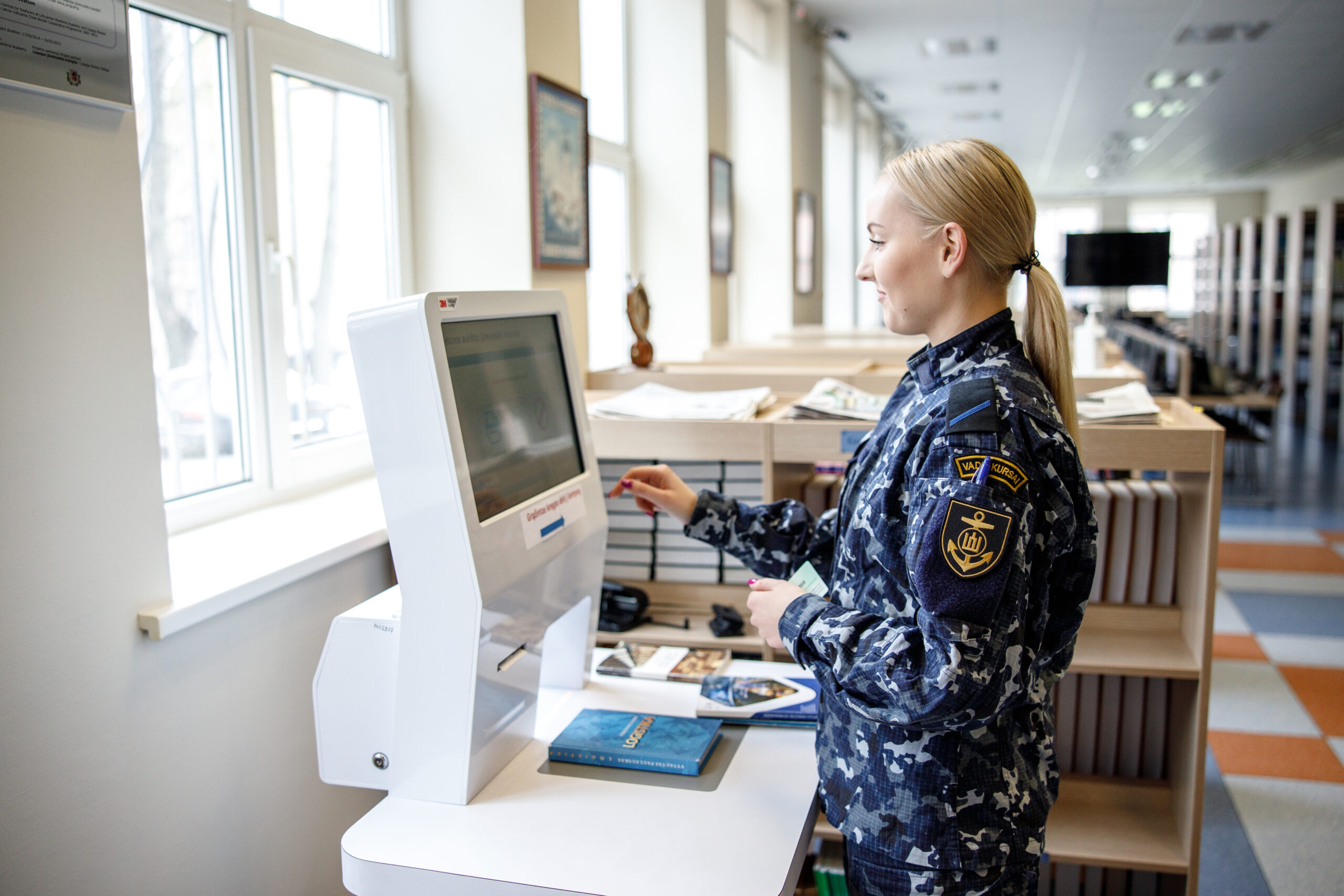
FOR QUESTIONS REGARDING STUDY PROGRAMMES, PLEASE CONTACT:
Room 114
Phone: +370 46 397 255
Mobile Phone: +370 692 83 739
Department of Port Engineering Vilma Locaitienė
E-mail: vilma.locaitiene@vilniustech.lt
Room 114
Phone: +370 46 397 255
Mobile Phone: +370 692 83 739
Administrator Asta Raudienė
E-mail: asta.raudiene@vilniustech.lt
a
This is the only management programme that trains specialists-managers for national and international maritime business and the maritime transport industry. The classical study programme has been offered for more than 20 years. The study programme was developed in cooperation with the Netherlands Maritime University.
STUDY PROGRAMME SPECIALIZATIONS
Management of Maritime Business
The purpose of the specialization is to act as agents for the formation of ships, shipping lines and crews, be able to freight forward various types of cargoes transported by sea and land, document customs procedures and carry out other related activities in the international maritime transport industry, taking into account the operational process features and technological features, in accordance with the requirements of national, international general and maritime legislation, and quality standards.
Management of Maritime Finances
The purpose of the specialization is to be able to manage and organize maritime business financial accounting according to the latest accounting technologies and methods in national and international maritime business, create accounting models for maritime business companies when working with international accounting programs.
Management of Maritime Tourism
The purpose of the specialization is to organize sea and inland tourism and hospitality business on the coast and coastline; be able to create water tourism routes; provide hospitality services to tourists; organize boat trips, operate small boats and take tourists on tours on coasts and coastlines, in accordance with the requirements of national and international tourism.
More information in the AIKOS
(Full-time studies)
(Part-time studies)
Duration of internship



The lecturers are researchers, scientists, and practitioners in the field of shipping, seaport technologies, port management, and maritime economics, who base their knowledge on the experience of professional activities in port companies.
CAREER
After choosing port and shipping management studies, graduates pursue careers from specialist to manager in seaport loading terminals, ships and shipping lines, seafarer recruitment ships, agencies, maritime freight forwarding companies, customs, customs brokerage companies, and other sea or land transport business and maritime transport industry management state enterprises in the country or abroad, e.g. in the units of the Lithuanian Army and Navy, Klaipėda State Seaport Authority, Maritime Department of the Lithuanian Transport Safety Administration, customs, etc.
A graduate can work in a sea port as a stevedore, cargo planner, freight forwarder, agent of ships, shipping line, or ship crew, ship charter broker, import and export manager, sea and land transport manager, logistics project manager, maritime (water) tourism manager and in other positions corresponding to the competencies of the manager in companies of seaport and maritime industry, as well as performing related work in companies servicing land transport or port activities.
GOAL OF THE STUDY PROGRAMME
Train a port and shipping manager who will be able to apply the knowledge of social, humanitarian, physical and technological sciences to operate in the domestic and international market of the maritime industry. This involves organizing the activities of seaport loading terminals, acting as an agent for the formation of ships, shipping lines, and crews, freight forward various types of cargo transported by sea and land routes, documenting customs procedures and carrying out other related activities in the international maritime transport industry, while taking into account the operational process features and technological features, in accordance with the requirements of national, international general and maritime legislation, quality standards, evaluating the performance results from the management efficiency and economic point of view.
INTERNSHIP
Graduation professional internship of port and shipping management is done in the 3rd year. The duration of the internship is 4 months. The advantage of graduation professional internship is that students are given the opportunity to delve into a specific, narrower field of port and shipping management and choose the internship according to specialization: port loading terminals, shipping, formation of ship crews, cargo freight forwarding, and ship agency.
Internships of port and shipping management can be done in the state institutions of port management and shipping supervision, sea cargo handling, shipping, freight forwarding, ship and shipping line agency or other businesses with related activity in the maritime industry or in companies related to the activities of this industry, customs offices of the Republic of Lithuania, the Navy of the Lithuanian Armed Forces. The information collected during the internship, the gathered data, and the acquired knowledge are used during the preparation of the graduation bachelor’s thesis. Many places for internship can be found in the online company database of Klaipėda State Seaport.
WHY CHOOSE THIS STUDY PROGRAMME?
The study programme ‘Port and shipping management’ is the only management programme that trains specialists-managers for national and international maritime business and the maritime transport industry.
– The only management study programme of the maritime transport industry in the country, widely available in all maritime academies of the world and part of the maritime study system.
– A student can freely choose part-time studies at any foreign maritime academy or university, as well as at other higher education institutions that offer management studies. This makes it possible for graduates to work in domestic and foreign seaports or maritime business companies.
– Studying in the study programme ‘Port and shipping management’ provides an opportunity to understand and learn how to manage the international maritime business industry, which operates 24 hours a day and 7 days a week. This role includes such activities as ship agency, cargo freight forwarding, international logistics project management, freight exchange management, and management of the international cargo logistics chain. The role requires knowledge of various cultures and management of intercultural organizations when forming the personnel of coastal ports, shipping companies, and ship crews.
CONTINUITY OF STUDIES
Graduates can continue their studies in second-cycle programmes in the field of social sciences and pursue a master’s qualification degree in accordance with the procedure established by national and foreign university higher education institutions. It is possible to improve qualifications in business management, international trade, international marketing, public administration, tourism management, or a similar field in order to acquire new competences.
ENVIRONMENT OF STUDIES
Studies take place in a modern environment that meets international requirements. There are traditional engaging lectures, seminars, discussions, analysis of scientific and professional literature, and students have access to a modern library filled with the latest scientific and informational publications, along with an internal digital teaching/learning environment and digital resources of the academy.
The studies are carried out using computer programmes and electronic simulators, prototypes of information systems operating in a seaport (Seaport Terminal Operations Management Simulator simulating maritime cargo handling processes, maritime cargo information system KIPIS, cargo route planning with ArcGIS and Sea Rates, application of Crew Inspector programmes, logistics and accounting system B1, maritime English language training programmes Marlins, MarEng, computer engineering graphics system AutoCad, etc.);
LMA is equipped with sports halls and gyms, which are intended for optional sports, physical education classes, sports competitions, sports and other events in which students of all study programmes participate. They can also spend their free time in these facilities.



SUBJECTS OF STUDY PROGRAMME
| 1st SEMESTER | CREDITS (ECTS) |
|---|---|
| Applied Mathematics and Programming | 5 |
| Information Technologies and Systems | 5 |
| Evolution of Seaports and Shipping (in English) | 5 |
| International Trade/ Shipping Market/ Geography of Transport Systems | 5 |
| Philosophy; Basics of Political Science; Sociology; European Culture | 5 |
| 2nd SEMESTER | CREDITS (ECTS) |
|---|---|
| Occupational Language Culture and Rhetoric | 5 |
| Basics of Port and Shipping Management (in English) | 5 |
| Management Theory | 5 |
| Basics of Logistics | 5 |
| Seaport Terminals and Operations | 5 |
| Second Foreign Language (Russian, German, Spanish) | 5 |
| 3rd SEMESTER | CREDITS (ECTS) |
|---|---|
| Maritime Business Management and Organizational Communication (in English) | 5 |
| Basics of Data Analytics | 5 |
| Economics and Digital Marketing of Business Enterprise | 5 |
| Personnel Management and Career Planning | 5 |
| Occupational, civil, and environmental safety | 5 |
| Management Psychology; Intercultural Communication; Self-development and Professional Development; Basics of Mindfulness Practice; Management of Psychological Resilience (Specialization: Management of Maritime Business) | 5 |
| Tax Law (Specialization: Management of Finances of Maritime Business) | 5 |
| Basics of Recreation and Tourism (Specialization: Management of Maritime Tourism) | 5 |
| 4th SEMESTER | CREDITS (ECTS) |
|---|---|
| Introductory Internship of Port and Shipping Activities | 5 |
| Training Internship of Seaport Loading Terminals (Digital Simulator) | 5 |
| Applied Research Methodology / Methodology of Applied Scientific Publication Preparation / Methodology of Applied Research Project Preparation | 5 |
| Commercial Maritime Law (Specialization: Management of Maritime Business) | 5 |
| Ship Agency (Specialization: Management of Maritime Business) | 5 |
| Formation of Crews for Sea Ships (Specialization: Management of Maritime Business) | 5 |
| Financial Accounting (Specialization: Management of Finances of Maritime Business) | 5 |
| Training Internship of Computerized Accounting (Specialization: Management of Finances of Maritime Business) | 5 |
| Business Ethics / Basics of Ethics/ Accountant Ethics/ Basics of Critical Thinking (Specialization: Management of Finances of Maritime Business) | 5 |
| Historical and Geographical Development of Coastal Regions (Specialization: Management of Maritime Tourism) | 5 |
| Management of Leisure Powerboats (without restrictions in inland and sea waters) (Specialization: Management of Maritime Tourism) | 10 |
| 5th SEMESTER | CREDITS (ECTS) |
|---|---|
| Thesis of the Professional Bachelor | 10 |
| Maritime Economics / Seaport Economics / Shipping Economics / Commercial Management of Shipping | 5 |
| Business Project Management / EU Fund Project Management / Maritime Business Project Management / Management of Fishery and Aquaculture Projects Marketing Project Management | 5 |
| Cargo Freight Forwarding and Customs Procedures (Specialization: Management of Maritime Business) | 5 |
| Training Internship of the Maritime Cargo Information System (digital simulator) (Specialization: Management of Maritime Business) | 5 |
| Quality Management (Specialization: Management of Maritime Business) | 5 |
| International Settlements (Specialization: Management of Finances of Maritime Business) | 5 |
| Financial Performance Analysis (Specialization: Management of Finances of Maritime Business) | 5 |
| Financial Technologies and Management (Specialization: Management of Finances of Maritime Business) | 5 |
| Methodology of Water Tourism Research and Tour Giving (Specialization: Management of Maritime Tourism) | 5 |
| Water Tourism Infrastructure and Business Management (Specialization: Management of Maritime Tourism) | 5 |
| Management of Hospitality Services for Sea Cruises and Coastal Tourism (Specialization: Management of Maritime Tourism) | 5 |
| 6th SEMESTER | CREDITS (ECTS) |
|---|---|
| Thesis of the Professional Bachelor | 10 |
| Graduation Professional Internship of Port Loading Terminals/ Shipping/ Ship Crew Formation/ Cargo Freight Forwarding/ Ship Agency | 25 |
| Graduation Internship in Maritime Business Accounting/Financial Performance Analysis/International Settlements/Taxes/Business Financial Management | 25 |
| Graduation Internship of Inland Tourism/Maritime Tourism Management | 25 |
ADVANTAGES OF STUDIES IN LITHUANIAN MARITIME ACADEMY:
• Student leisure area
• Higher education high quality studies in Europe
• Worldwide benchmarked marine and onshore study programmes
• Prestige and quality
• Study mobility in more than 60 higher education institutions and Partners in Europe in frame of Erasmus+ programme
• Training using modern simulators
• Studies and practice in strong cooperation with maritime industry
• The uniqueness of studies is links with global maritime industry – guest Lecturers are invited from various port companies, field trips are organised
• Research and practice are provided









